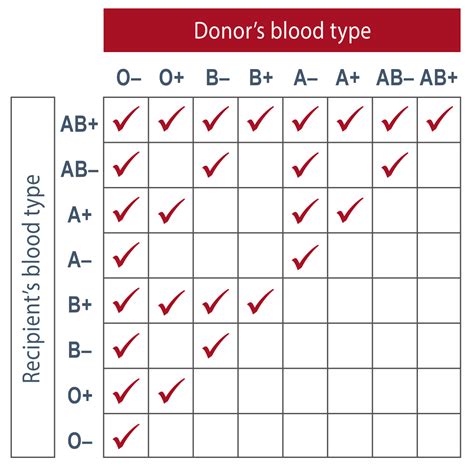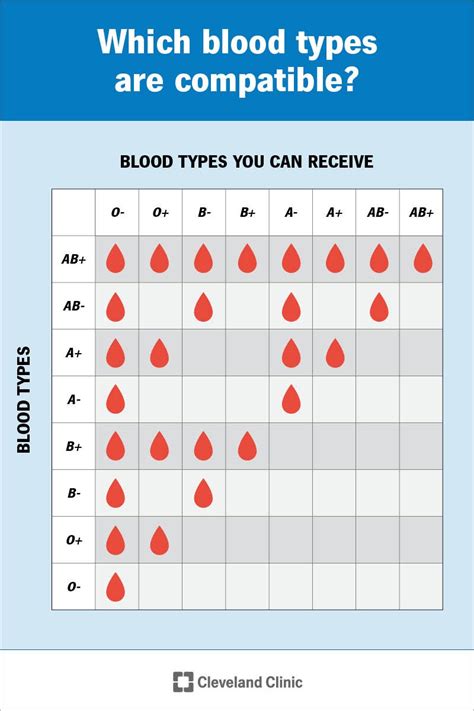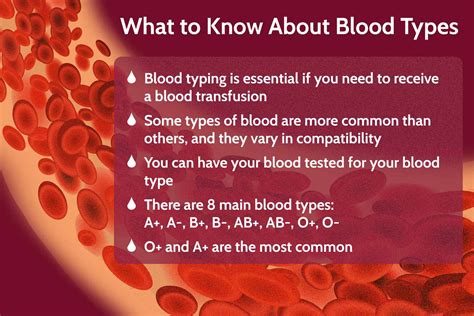The importance of knowing one's blood type cannot be overstated, as it plays a crucial role in various medical procedures, including blood transfusions and organ transplants. A blood test for blood type is a simple yet essential procedure that helps determine an individual's blood type, which is classified into four main groups: A, B, AB, and O. Understanding the significance of blood type and the process of determining it can help individuals make informed decisions about their health and medical care. With the advancements in medical technology, blood tests have become more efficient and accurate, making it easier for individuals to know their blood type and take necessary precautions.
The history of blood type discovery dates back to the early 20th century, when Austrian physician Karl Landsteiner identified the ABO blood group system. Since then, the understanding of blood types has evolved, and today, we know that blood type is determined by the presence or absence of specific antigens on the surface of red blood cells. These antigens trigger an immune response, which can lead to adverse reactions if incompatible blood types are mixed. A blood test for blood type helps identify these antigens and determines the individual's blood type, which is essential for ensuring safe blood transfusions and transplants.
In addition to its medical significance, knowing one's blood type can also provide insights into an individual's health and susceptibility to certain diseases. For instance, research has shown that individuals with certain blood types may be more prone to specific health conditions, such as heart disease or digestive issues. While the relationship between blood type and disease susceptibility is still being researched, having knowledge of one's blood type can help individuals take proactive steps towards maintaining their health and well-being. With the increasing awareness of the importance of blood type, more people are opting for blood tests to determine their blood type and understand its implications on their health.
Blood Type Classification
The classification of blood types is based on the presence or absence of specific antigens on the surface of red blood cells. The ABO blood group system is the most commonly used classification system, which categorizes blood into four main groups: A, B, AB, and O. Each blood type has unique characteristics, and understanding these differences is essential for ensuring safe blood transfusions and transplants. The following are the main blood types and their characteristics:
* Type A: Has A antigens on the surface of red blood cells
* Type B: Has B antigens on the surface of red blood cells
* Type AB: Has both A and B antigens on the surface of red blood cells
* Type O: Has no A or B antigens on the surface of red blood cells
How Blood Type is Determined
Determining blood type involves a simple blood test, which can be performed at a medical laboratory or a hospital. The test involves collecting a blood sample from the individual, which is then mixed with antibodies against A and B antigens. The reaction between the blood sample and the antibodies determines the individual's blood type. The following steps are involved in determining blood type:
1. Blood sample collection: A blood sample is collected from the individual using a sterile needle and syringe.
2. Mixing with antibodies: The blood sample is mixed with antibodies against A and B antigens.
3. Reaction observation: The reaction between the blood sample and the antibodies is observed.
4. Blood type determination: Based on the reaction, the individual's blood type is determined.
Importance of Knowing Blood Type
Knowing one's blood type is essential for various medical procedures, including blood transfusions and organ transplants. Incompatible blood types can lead to adverse reactions, which can be life-threatening. The following are some of the importance of knowing blood type:
* Safe blood transfusions: Knowing blood type ensures that the individual receives compatible blood during transfusions.
* Organ transplants: Blood type compatibility is essential for successful organ transplants.
* Medical emergencies: Knowing blood type can help medical professionals make informed decisions during emergencies.
* Health and wellness: Understanding blood type can provide insights into an individual's health and susceptibility to certain diseases.
Blood Type and Disease Susceptibility
Research has shown that individuals with certain blood types may be more prone to specific health conditions. While the relationship between blood type and disease susceptibility is still being researched, having knowledge of one's blood type can help individuals take proactive steps towards maintaining their health and well-being. The following are some of the potential links between blood type and disease susceptibility:
* Heart disease: Individuals with type A blood may be more prone to heart disease.
* Digestive issues: Individuals with type O blood may be more prone to digestive issues.
* Cancer: Some research suggests that individuals with certain blood types may be more prone to specific types of cancer.
Blood Type and Nutrition
Understanding blood type can also provide insights into an individual's nutritional needs. Some research suggests that individuals with certain blood types may benefit from specific diets or nutritional supplements. The following are some of the potential links between blood type and nutrition:
* Type A: May benefit from a vegetarian diet
* Type B: May benefit from a balanced diet that includes a variety of foods
* Type AB: May benefit from a diet that includes a mix of vegetarian and meat-based foods
* Type O: May benefit from a diet that is high in protein and low in carbohydrates
Blood Type Testing
Blood type testing is a simple and non-invasive procedure that can be performed at a medical laboratory or a hospital. The test involves collecting a blood sample from the individual, which is then mixed with antibodies against A and B antigens. The reaction between the blood sample and the antibodies determines the individual's blood type. The following are some of the benefits of blood type testing:
* Accurate diagnosis: Blood type testing can help medical professionals make accurate diagnoses and develop effective treatment plans.
* Safe blood transfusions: Blood type testing ensures that the individual receives compatible blood during transfusions.
* Organ transplants: Blood type testing is essential for successful organ transplants.
Conclusion and Future Directions
In conclusion, knowing one's blood type is essential for various medical procedures, including blood transfusions and organ transplants. Understanding blood type can also provide insights into an individual's health and susceptibility to certain diseases. While the relationship between blood type and disease susceptibility is still being researched, having knowledge of one's blood type can help individuals take proactive steps towards maintaining their health and well-being. Future research should focus on exploring the potential links between blood type and disease susceptibility, as well as the role of blood type in nutrition and overall health.
What is the importance of knowing blood type?
+
Knowing blood type is essential for various medical procedures, including blood transfusions and organ transplants. It can also provide insights into an individual's health and susceptibility to certain diseases.
How is blood type determined?
+
Blood type is determined by a simple blood test, which involves collecting a blood sample from the individual and mixing it with antibodies against A and B antigens. The reaction between the blood sample and the antibodies determines the individual's blood type.
What are the potential links between blood type and disease susceptibility?
+
Research has shown that individuals with certain blood types may be more prone to specific health conditions, such as heart disease, digestive issues, and cancer. However, the relationship between blood type and disease susceptibility is still being researched.
Can blood type testing help with nutrition and overall health?
+
Understanding blood type can provide insights into an individual's nutritional needs and overall health. Some research suggests that individuals with certain blood types may benefit from specific diets or nutritional supplements.
Is blood type testing a simple and non-invasive procedure?
+
Yes, blood type testing is a simple and non-invasive procedure that can be performed at a medical laboratory or a hospital. The test involves collecting a blood sample from the individual, which is then mixed with antibodies against A and B antigens.
We hope this article has provided you with a comprehensive understanding of blood type and its importance in medical procedures and overall health. If you have any further questions or would like to share your thoughts, please feel free to comment below. Don't forget to share this article with your friends and family to help them understand the significance of blood type. Together, we can promote awareness and education about blood type and its role in maintaining our health and well-being.







